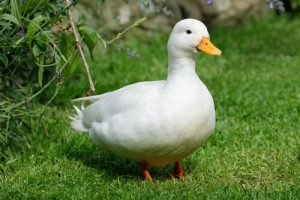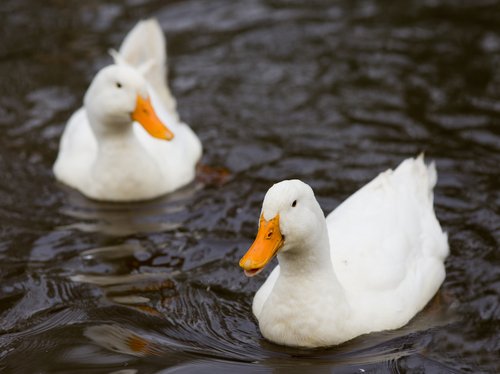Basic Duck Care


Written and verified by the lawyer Francisco María García
Successfully raising ducks takes knowledge and dedication. Basic duck care involves all the specific aspects they need as a species. Here are some pieces of advice when it comes to taking care of them.
Ducks: physical traits and behavior
“Ducks” are any species of bird that belong to the Anatidae family. They have round bodies, flat, wide beaks, and short, webbed feet. They usually live between 10-15 years, although it varies depending on the species and habitat.
Ducks are adapted to an aquatic lifestyle. They’re great swimmers by nature, and are generally very elegant, secure, and calm in the water. When they’re on the ground they have their clumsy “waddle” due to their webbed feet.

Ducks are highly social creatures, and it’s in their nature to live in big flocks or as couples. In fact, their friendliness and easy going lifestyle have won over the hearts a lot of people, which is why many people end up getting ducks as pets.
Basic Duck Care: a good diet
Basic duck care is all about having a good diet that’s meets the needs as a species.
Ducks are omnivorous and prefer a very mixed diet. More than 70% of the diet should be made up of fruits, vegetables, seeds, legumes, and grains. They also get protein from animals because they eat small fish and insects.
An adult duck eats between 5-7 ounces of food a day, but it also depends on the species, sex, and habitat. The specific diet you give your duck might also depend on what you’re raising it for.
A fattening diet
A lot of ducks are raised to be eaten. Duck meat — mostly from the liver — is a delicacy in the culinary world. It also has nutritional benefits that an increasing number of nutritionists and doctors are recognizing. The growing demand in national and international markets has also caused more farmers and business-people to start raising them.
When ducks are raised as poultry, people usually use fattening methods to get the most meat out of each duck. So, they use commercial foods with a huge concentration of carbohydrates, about 25% protein, and not much fiber.
Diet for a domestic duck
Raising ducks as pets is “trending” right now. If that’s your goal, you don’t give them a fattening diet, you aim for a balanced one.

You shouldn’t give a pet duck commercial food meant for farm ducks. Eating these kinds of foods can to obesity and other related diseases. When you adopt a pet duck, you have to respect its nutritional needs. It’s always best to give them natural food and make sure you always keep it fresh. A lot of owners use vitamin supplements. Their objective is to add onto their duck’s food-based diet and strengthen its immune system.
Good hydration
You absolutely have to make sure they have fresh, clean water. This is important whether you’re raising ducks to be eaten or as pets. It’s also good to clean out their food and drinkers on a daily basis.
Hygiene: plays an important role to basic duck care
When they live in the wild, ducks usually tidy up every day — both themselves and their nests. It’s common to see them spend hours cleaning up their feathers and homes.
Ducks are naturally clean and can easily get sick if they live in an unclean environment. Hygiene plays an important role in basic duck care. You should clean their area at least once or twice a week. You should also clean up after they eat and drink on a daily basis.
Creating a Nice Environment for Ducks
Ducks need a lot of space, along with a clean water source (pond, pool, etc.) in order to swim, clean themselves, and take a drink whenever they are thirsty. They also need to swim and walk around regularly to make sure they stay in good shape.
Rabbit pens or chicken coops are usually good homes for ducks — a place they can feel safe and get some rest. How big their home is will just depend on how many ducks, and how much free space you have.
Ducks are generally tough as long as they have a good diet and live in good conditions. Preventative medicine and frequent visits to the vet are still important parts of basic duck care, to make sure your little friends stay happy and healthy.
Successfully raising ducks takes knowledge and dedication. Basic duck care involves all the specific aspects they need as a species. Here are some pieces of advice when it comes to taking care of them.
Ducks: physical traits and behavior
“Ducks” are any species of bird that belong to the Anatidae family. They have round bodies, flat, wide beaks, and short, webbed feet. They usually live between 10-15 years, although it varies depending on the species and habitat.
Ducks are adapted to an aquatic lifestyle. They’re great swimmers by nature, and are generally very elegant, secure, and calm in the water. When they’re on the ground they have their clumsy “waddle” due to their webbed feet.

Ducks are highly social creatures, and it’s in their nature to live in big flocks or as couples. In fact, their friendliness and easy going lifestyle have won over the hearts a lot of people, which is why many people end up getting ducks as pets.
Basic Duck Care: a good diet
Basic duck care is all about having a good diet that’s meets the needs as a species.
Ducks are omnivorous and prefer a very mixed diet. More than 70% of the diet should be made up of fruits, vegetables, seeds, legumes, and grains. They also get protein from animals because they eat small fish and insects.
An adult duck eats between 5-7 ounces of food a day, but it also depends on the species, sex, and habitat. The specific diet you give your duck might also depend on what you’re raising it for.
A fattening diet
A lot of ducks are raised to be eaten. Duck meat — mostly from the liver — is a delicacy in the culinary world. It also has nutritional benefits that an increasing number of nutritionists and doctors are recognizing. The growing demand in national and international markets has also caused more farmers and business-people to start raising them.
When ducks are raised as poultry, people usually use fattening methods to get the most meat out of each duck. So, they use commercial foods with a huge concentration of carbohydrates, about 25% protein, and not much fiber.
Diet for a domestic duck
Raising ducks as pets is “trending” right now. If that’s your goal, you don’t give them a fattening diet, you aim for a balanced one.

You shouldn’t give a pet duck commercial food meant for farm ducks. Eating these kinds of foods can to obesity and other related diseases. When you adopt a pet duck, you have to respect its nutritional needs. It’s always best to give them natural food and make sure you always keep it fresh. A lot of owners use vitamin supplements. Their objective is to add onto their duck’s food-based diet and strengthen its immune system.
Good hydration
You absolutely have to make sure they have fresh, clean water. This is important whether you’re raising ducks to be eaten or as pets. It’s also good to clean out their food and drinkers on a daily basis.
Hygiene: plays an important role to basic duck care
When they live in the wild, ducks usually tidy up every day — both themselves and their nests. It’s common to see them spend hours cleaning up their feathers and homes.
Ducks are naturally clean and can easily get sick if they live in an unclean environment. Hygiene plays an important role in basic duck care. You should clean their area at least once or twice a week. You should also clean up after they eat and drink on a daily basis.
Creating a Nice Environment for Ducks
Ducks need a lot of space, along with a clean water source (pond, pool, etc.) in order to swim, clean themselves, and take a drink whenever they are thirsty. They also need to swim and walk around regularly to make sure they stay in good shape.
Rabbit pens or chicken coops are usually good homes for ducks — a place they can feel safe and get some rest. How big their home is will just depend on how many ducks, and how much free space you have.
Ducks are generally tough as long as they have a good diet and live in good conditions. Preventative medicine and frequent visits to the vet are still important parts of basic duck care, to make sure your little friends stay happy and healthy.
This text is provided for informational purposes only and does not replace consultation with a professional. If in doubt, consult your specialist.








